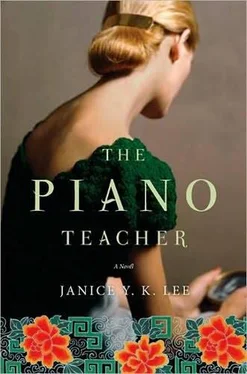And then New Year’s Eve, Will wakes up and turns on the switch, only to find the electricity is gone. The telephone works intermittently.
Trudy rallies against the silence that greets these announcements.
“Who needs all those gadgets,” she says. “They’re more work anyway. And everyone looks better by candlelight.” She pauses. “I think we should have a party. A real bang-up New Year’s party, and invite all our fellow campers who are up here with us on the Peak. I’ll see what we have and we can do a potluck-style evening.”
The Millers live down the road, a fashionable American family of six who are hunkering down with their six or seven servants-two or three amahs, a baby amah, a cook, a houseboy, and a gardener. They come by every once in a while to share information and for human contact. Trudy goes with Will to invite them and insists they bring everyone, including the servants and the baby.
“They can hang out in the kitchen and be part of it, a bit. You don’t want to leave them alone-they might not be there when you come back!”
The bemused Millers agree to come and bring whatever they can spare, and to spread the word.
On the way home, Trudy says, “There’s that story of the village with the soup. Do you know it? ”
“No,” Will says. “Village? ”
“There was a village with a chief who wanted to throw a big party with a communal soup. He asked everyone to bring something for the soup-a meat or a vegetable or something good, you know. But everyone thought that everyone else would bring something so they just brought a stone, figuring no one would notice. And in the end, tragic as it is, the soup was not delicious, or something like that.” She stops. “I don’t know why I told you that just now. Except that the people in that village were definitely not Chinese, having so little respect for food.”
“You’re afraid the Millers will bring rocks to our party?”
“No, idiot,” she says. “I’m afraid people aren’t honorable.”
But of course the party is a wild success. Though no dress is specified, people come in their finest, a sort of last gasp to the world as they know it. They gather together at Angeline’s house, like moths to a flame, bringing surprising delicacies brought up from secret cellars-a case of champagne (“Why not?” the giver reasons. “Just figured it was now or some Jap would be bathing in it later”), five freshly slaughtered chickens, sardines, a small sack of rice, watercress, cheese, bananas. And this still being Hong Kong, people have brought their servants to prepare and serve it all.
“A veritable feast,” Trudy says, looking at the table.
“The proverbial groaning table,” says Will.
“I wouldn’t go that far, darling.” She kisses him on the cheek. “Doesn’t it feel like we’re on school holiday? You don’t need to go to work, I don’t need to pretend to do anything with my time. Anything goes.”
Young Ned Young, a little more comfortable in his situation now, pulls Will aside. “That Trudy is something else,” he says. “Where’d you find her? I never met anyone like her, for sure.”
Men in dinner jackets and women in evening gowns are lounging in chairs, on the floor, drinking beer and tea out of odd containers-jam jars and tins-eating crackers and sardines. There’s no music so people offer to sing and play the piano. The instrument’s terribly out of tune, but the music is sweet and the voices lovely.
Close to midnight, they gather around the biggest candle in the living room and count down.
“Ten, nine,” they start, before Trudy interrupts.
“Let’s prolong this. Let’s count down from fifty instead. Do we really have anything better to do?” People are agreeable and start over.
“Fifty, forty-nine, forty-eight…” And then something odd happens. Somewhere between thirty-four and thirty-three, the mood changes and it seems as if they are counting toward something that is rather important. They are chanting and their voices gather force and purpose, so that as they count down into the twenties and into the teens and the single digits, they become louder and braver, until they get to “five, four, three, two… one” and they burst into cheers and hug one another and feel, for a moment, as if something has been salvaged. Women wipe away tears and men clap one another on the back.
“Happy New Year, my darling,” Trudy says, kissing Will. “May this be the worst Eve we ever experience.”
To the room she lifts her glass. “It’s time,” she says, “to bury the silver and put away the sheets in the hot room. It will be over, but we don’t know when.”
At the end, guests leave in the wee hours, or stay, strewn among the many sofas and chairs, scared to go back outside, but wanting to get home. Trudy ministers to them, providing water and soothing words, until they muster up the courage to pull themselves together, expel the effects of drink, and lurch into the night, one eye cocked toward the sky for enemy aircraft.
ON THE FOURTH DAY of the new year, Trudy comes in with a leaflet in her hand.
“They’re collecting people,” she announces, and reads from it.
“ ‘Since the Japanese occupation of Hong Kong on Christmas Day, enemy aliens have been allowed free movement in practically all urban districts of the colony’-very generous of them isn’t it? Then there’s something about generals and army orders, and then it says, ‘All enemy civilians’-that does make you sound dangerous, Will-‘all enemy civilians shall assemble at the Murray Parade Ground on January fifth.’ You are allowed to carry personal effects, and the care of your house is your own personal responsibility. Enemies include British, Americans, Dutch, Panamanians and whoever else has been disagreeable enough to war with our conquerors.” She looks up. “I think I’m off scot-free.”
“Are you?”
“Well, I’m none of those categories, certainly. And I’ve secreted my British passport away somewhere very safe so no one need know about it. And I don’t think a dislike of origami qualifies me as warring with the Japanese. But we’ll have to get you there, I suppose, unless you want to go elsewhere? ” She wrinkles her brow. “ China? Some people are arranging passage.”
“No, I think staying in Hong Kong will be better. They will have to do things in a way that is accountable. If they gather us together, they have to register us and let our governments know, I would imagine.” He shrugs his shoulders. “But we should decide what to do with Ned.”
Over a sparse lunch of rice and salted cabbage, they decide to clean the Canadian up and register him as English.
“Pretend you lost your passport-a fire when a bomb hit your home or something. Your accent is a problem though,” Trudy says. “Do you think the Japanese will notice? ”
“I could pretend to be American,” he says earnestly.
“But we don’t know any Americans to take you under their wing. Better you stick with Will and keep your mouth shut.”
Trudy says again she will not register.
“Angeline, you could go with Will and Ned, since Frederick is English. You’re counted as English, then. You have your marriage certificate somewhere, don’t you? I’ll be fine out here without you. So many family friends have offered to take me in, I won’t be alone.” Trudy strokes her friend’s arm.
“I’ll stay here with you, I think. Don’t you?”
“Why can’t you pretend you’re in government and not go?” Trudy asks Will. “Colonial staff are exempt from the order.”
“Darling,” he says. “There are ways of verifying these things. It would be worse if I lied and were to be found out.”
“But you won’t be allowed to come back, then, do you think? They’re not going to write down your name, give you a pat on the back, and send you on your way?”
Читать дальше












